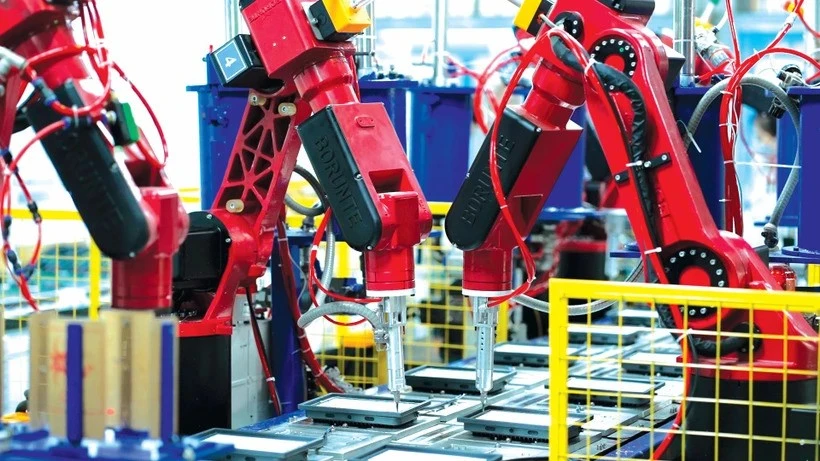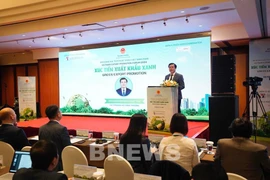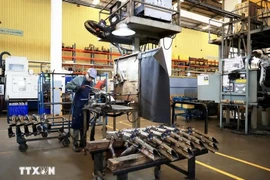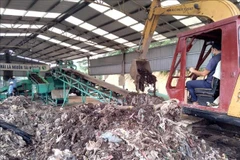Hanoi (VNA) – Digital transformation and innovation are emerging as the "buzzwords" shaping the future of Vietnamese economy. The year 2025 is expected to mark a major turning point, driven by the robust integration of Industry 4.0 technologies.
Against the backdrop of geopolitical shifts, a global tech race, and rising inflation, Vietnam's economy in 2025 is expected to face both challenges and opportunities. What will be the primary drivers of growth, and how can Vietnam capitalise on these opportunities while navigating potential hurdles?
In an exclusive interview granted to VietnamPlus, Deputy Director of the Central Institute for Economic Management (CIEM) Luong Van Khoi offered his insights on the economic outlook for 2024 and prospects for 2025.
Breakthroughs define 2024
- How would you evaluate Vietnam’s economic performance in 2024?
Luong Van Khoi: Vietnam's economy in 2024 has seen notable breakthroughs. First and foremost, decisive actions from the Party, State, and Government have been instrumental in addressing challenges related to public investment disbursement. Export turnover witnessed strong growth in the first 11 months of this year, surpassing the 2023 level and nearing the 2022 figure. I estimate that Vietnam’s economy will grow by around 7.25% this year, thanks to effective Government management and a surge in global demand despite political uncertainty.
Second, investment flows, especially foreign direct investment (FDI), have shown positive signs of recovery. Notably, FDI disbursement exceeded 21 billion USD in the first 11 months.
While the rate of businesses exiting the market compared to new entrants remained high, it declined significantly compared to the first nine months of 2024. Notably, domestic private sector investment demonstrated robust growth. The share of private sector investment in total social investment reached over 55-59.5% annually, a marked increase compared to pre-COVID-19 years. This growth outpaced both state and foreign-invested sectors, indicating that while the exit rate of enterprises has been relatively high in recent years, it is not a major concern.

Moreover, innovation and digital transformation are being rapidly accelerated from the central to the local level, serving as a key catalyst for growth. I anticipate that in foundational, core, and pillar industries, companies embracing automation will achieve higher productivity. For instance, in the steel industry, productivity could surge by up to 50%. Domestic consumption is on the rise, bolstered by improved income and labour productivity compared to the COVID-19 period.
- Besides the positive aspects, what are the existing challenges in the economy this year?
Luong Van Khoi: The biggest issue remains the disbursement of investment capital. The rate of disbursement from the state budget reached only 73.5% of the 2024 plan in the first 11 months of this year, with public investment disbursement standing at just 54.8%, lower than the same period in 2023. Meeting the annual targets is a challenge, but localities, especially Hanoi and Ho Chi Minh City, have committed to accelerating the progress and achieving the disbursement goals.
The domestic economic sector has not yet made a significant contribution to overall growth. Notably, the key economic areas such as Ho Chi Minh City, Hanoi, Binh Duong, Dong Nai, and Ba Ria-Vung Tau are seeing their share in total GDP decrease. The reason for this is that they have reached their limits, while other regions have started to grow.
On the other hand, business efficiency is very important. According to CIEM, while business efficiency has nearly doubled over the past decade, it still falls short of expectations. Specifically, industries like footwear, electronics, and apparel - key export sectors that bring in significant foreign exchange – operate at only about 50% in terms of technical and scale efficiency. This is attributed to both internal factors such as workforce quality and management and external factors like business environment, global market shock, and how Vietnam handles these shocks. Furthermore, industries still mainly focus on outsourcing, which results in lower added value. If business efficiency was improved, double-digit growth would be within reach for Vietnam.
GDP growth target of 8%
- What is the economic outlook for Vietnam in 2025, sir?
Luong Van Khoi: With a target of 8% GDP growth, I believe Vietnam could achieve this. Exports are expected to continue growing thanks to an extensive network of free trade agreements (FTAs), particularly the newer generation FTAs. Although the new term of US President Donald Trump may introduce policies that impact Vietnam, it also opens up opportunities for attracting investment flows shifting from other countries in the region. The Government is also focusing on attracting quality FDI into new industries such as semiconductor and artificial intelligence (AI).
Digital transformation and artificial intelligence will be key growth drivers. The implementation of Politburo Resolution No. 52-NQ/TW dated September 27, 2019 on the Fourth Industrial Revolution, along with the resolution on digital transformation to 2050, these will drive the development of production forces, improve production relations, and usher the country into a new era. This will create a favourable legal framework for the application of 4.0 technologies. Ultimately, digital transformation will be a major contributor to economic growth.

Building on this foundation, we must double down on investments in hi-tech agriculture and organic farming. In the coming year, private investment is poised to continue its robust growth trajectory. Meanwhile, public investment in infrastructure, particularly large-scale projects like the North-South railway and nuclear power, will generate new momentum for growth. Notably, in 2025, all 63 cities and provinces will concurrently initiate socio-economic development planning, providing an additional boost. Coupled with the Government's ongoing efforts to streamline its apparatus, these factors will create a solid foundation for economic growth in 2025.
- How will the US policies under President Donald Trump impact the Vietnamese economy, sir?
Luong Van Khoi: The US policies have a significant impact on Vietnam as the US is a major export market where Vietnam enjoys a substantial trade surplus. The imposition of tariffs on goods exported to the US and the US withdrawal from the Paris Agreement also presents a challenge to Vietnam's commitment to achieving Net Zero by 2050.
Regarding monetary policy, President Trump inherited a large Government debt. As a result, fiscal policy will likely focus on attracting investment with a loose monetary policy. This could have significant implications for exchange rates and Vietnam's exports.
However, the US's hardline policy toward China could create opportunities for Vietnam to draw shifting investment flows. Vietnam could become a new manufacturing hub, attracting investment in both hi-tech industries and other sectors.
- Thank you very much!




























